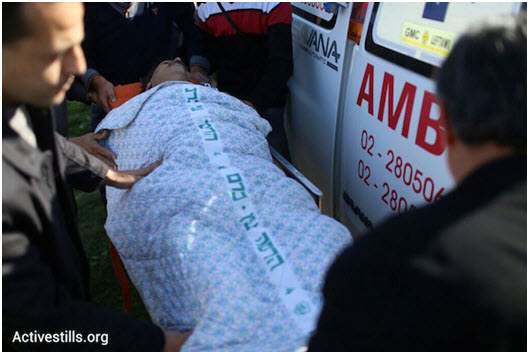Wednesday, December 10, Zaid Abu Ein, the head of the Palestinian Authority (PA) Committee against the Separation Wall and Settlements died after Israeli soldiers assaulted him in a village near Ramallah. MK Dov Khenin (Hadash) has called for an immediate commission of inquiry into the death, pointing to the IDF’s use of dangerous measures to disperse crowds.
According to sources from the PA committee he headed, Abu Ein, 55, died after an Israeli soldier beat him on the chest with his helmet in the village of Turmsayya in the Ramallah district. The victim also suffered severe tear gas inhalation as Israeli soldiers fired canisters in the area. Abu Ein lost consciousness and was taken to Ramallah Public Hospital where he was later pronounced dead. Medical sources told the Palestinian news agency Ma’an that Abu Ein lost consciousness and that his heart stopped after being beaten by Israeli soldiers and inhaling tear gas.

Palestinian official Ziad Abu Ein after reportedly being struck by Israeli troops. He later died in a Ramallah hospital, December 10, 2014. (Photo: Activestills)
Ziad Abu Ein was a member of the Fatah movement’s Revolutionary Council, and served as undersecretary to the Minister of Prisoner Affairs before Abbas appointed him head of the Committee against the Separation Wall and Settlements.
Worldwide attention has focused on the death of Abu Ein, after he participated in a nonviolent demonstration north of Ramallah, in the West Bank. He had joined Palestinian farmers from the village of Turmusaya who were protesting on the Human Rights Day (December 10), to regain access to their land. According to the Israeli NGO B’Tselem “while the circumstances of Abu Ein’s death are not yet clear, the reason for the demonstration and the way Israeli security forces handle Palestinian protests are all too familiar.”
The demonstrators were holding tree saplings to plant on plots of land they own, but to which they have been denied access since the establishment of the Israeli outpost Adei Ad, east of their village. Such settlements, which are officially unauthorized by the state, are yet another means by which Israel has taken over vast tracts of land in the West Bank, from which Palestinians are then excluded. Although portrayed as the action of extremist settlers, the establishment of these outposts is in fact a state enterprise assisted by all government bodies, whether actively or by omission, a fact that has been well documented.
The protest accompanied a petition to Israel’s Supreme Court for the evacuation of the Adei Ad outpost, filed by the residents of Turmusaya through the NGO Yesh Din. As in other cases in the West Bank, the decision to demonstrate to regain access to the land was made only after all other avenues had been exhausted, including letters to authorities, legal action, intervention of international actors, media reports, and more. None of these efforts helped the landowners reclaim their property, nor did they improve the conditions of Palestinian communities harmed by the existence and expansion of the outpost.
Any form of Palestinian protest against the occupation, even when it is entirely nonviolent (as was apparently the case in Turmusaya on December 10) is unlawful under Israeli martial law which applies to Palestinians in the West Bank. Israeli security forces are authorized to, and often do, disperse any Palestinian demonstration, even when participants are nonviolent. To that end, they use crowd control weapons including stun grenades, tear gas grenades, and “skunk” water sprayed on demonstrators, as well as direct bodily physical violence. Israeli security forces also make arrests and prosecute demonstrators, both organizers and participants, even when the latter are totally nonviolent. Needless to say, it is extremely rare for such measures of crowd dispersal to be taken against Israeli settlers protesting nonviolently.
According to B’Tselem: “The state sends settlers to forcefully take over Palestinian land in the West Bank and then sends the army to forcefully silence protest against the land grab – sometimes, at a lethal price. That is how Human Rights Day looks for people who live under occupation, where even demonstrating against dispossession is not allowed. That is what life, and sometimes death, looks like under occupation.”
Related:
Human Rights Day in Turmusaya, West Bank: nonviolent Palestinian protest violently dispersed


